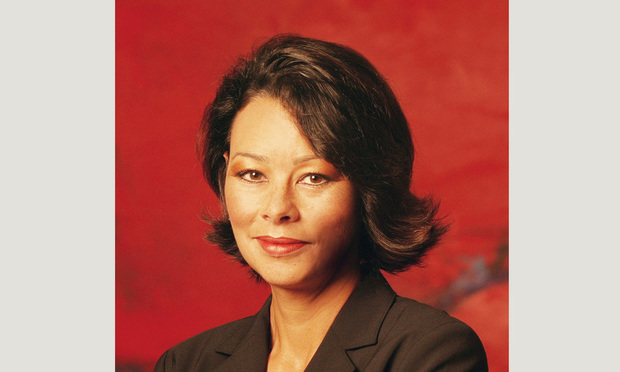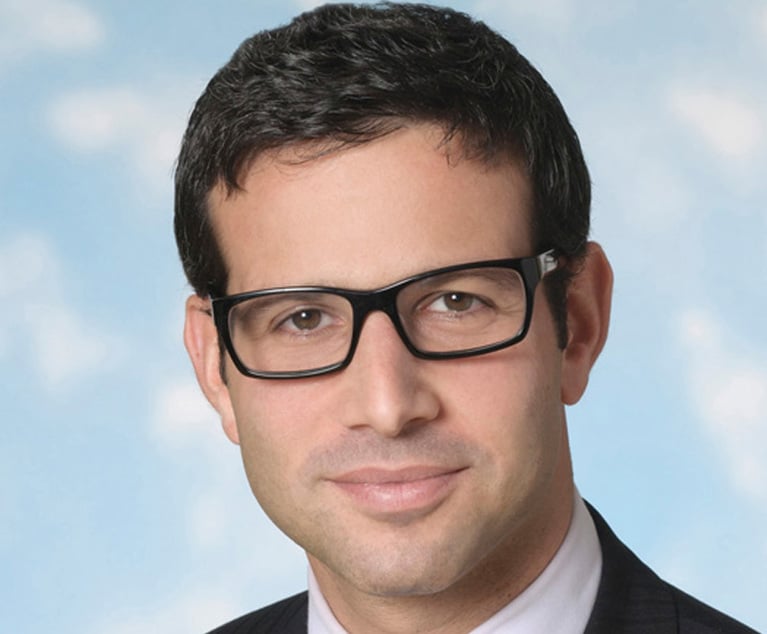Diversity and Inclusion Champion: Debra Tsuchiyama Baker, Baker Wotring
Baker, an environmental lawyer for more than 30 years, is the managing partner of Baker Wotring. Having experienced hatred and racism growing up in…
September 03, 2019 at 01:00 AM
5 minute read
 Debra Tsuchiyama Baker.
Debra Tsuchiyama Baker.
Baker, an environmental lawyer for more than 30 years, is the managing partner of Baker Wotring. Having experienced hatred and racism growing up in post-World War II America because of her Asian heritage, Baker became a vocal advocate of diversity and inclusion and has devoted a significant portion of her career to educating the legal profession on those issues.
The State Bar of Texas has featured Baker in their Women in the Law Program to teach young lawyers how to build minority attorney networks and she has teamed with the Texas Young Lawyers Minority Mentoring Program to prepare minority law students for job interviews. Baker Wotring also funded scholarships in 2017, 2018 and 2019 for minority law students and Baker has served as the annual diversity speaker and underwriter for the American Association of Corporate Counsel Diversity Group for those years as well. Baker has also played a key role in raising over $1 million for legal charities supporting women, children and minorities by writing an annual all-lawyer show for the 501 (c)(3) Night Court project.
What is one thing law firms can do immediately to help improve diversity and inclusion within their organizations?
They can follow the lead of their clients. General Counsel in corporate America today are increasingly making it very clear that they will insist on diversity in their legal representation. If firms do not figure out a way to put together diverse teams, clients who are serious about diversity will go elsewhere. They can find other firms who take it more seriously, including high-quality minority and women attorneys who have left big law firms to start their own law firms. Immediate improvement starts at the top. If law firm top management makes it absolutely clear that the firm will become a diverse workplace, then people will find a way to make that happen if they know failure is not an option.
What is one piece of advice you would give someone that you wish you had starting out?
Be yourself—you do not have to hide who you really are to be a successful lawyer. In one of my first trials in the 1980s, the lawyers on my trial team were worried that the East Texas jurors would be threatened by a young woman lawyer. The concern was whether the women jurors would think I should be home taking care of kids and whether the male jurors would think I was taking a job away from a man who really needed it. It seems ludicrous now, but at the time this was believed to be a real problem. To address this concern, it was decided that I would wear no makeup, wear my hair in a bun, and dress in plain dark suits with no heels so as not to draw attention to myself. But the jury was so much smarter than all of us. After the trial, they told my boss to tell me that I had done a very good job, but that if I put on a little makeup, did my hair and got some better clothes, I would be "a right-nice looking girl." They were not threatened by a woman on the trial team and they gave me advice that I will pass along now: You don't have to pretend to be someone you're not. You just have to be a good lawyer.
Name an important opportunity you got early in your career and what you did with it.
When I was in law school at Georgetown in Washington, D.C., I had the opportunity to work for Supreme Court Justice Sandra Day O'Connor as her personal calligrapher. I handwrote her invitations and thank you notes to the President of the United States and many other dignitaries, which she sometimes let me deliver to them in person, which was exciting. But what was most important was that she gave me advice I didn't even know I needed. When a particularly important case was to be argued at the Supreme Court, she would say, "You should invite your law professors to join you as my guest and sit in my reserved seats." I had not even thought to ask for that opportunity, but she knew it would help me make an impression on my professors, which it did. When I graduated from law school, Justice O'Connor (an avid golfer) gave me her last piece of advice. "Learn to play golf. Deals are done on the golf course and you need to be able to go where the men are." She was a woman of great wisdom and I learned to play golf because of her. I only wish I was good at it.
This content has been archived. It is available through our partners, LexisNexis® and Bloomberg Law.
To view this content, please continue to their sites.
Not a Lexis Subscriber?
Subscribe Now
Not a Bloomberg Law Subscriber?
Subscribe Now
NOT FOR REPRINT
© 2025 ALM Global, LLC, All Rights Reserved. Request academic re-use from www.copyright.com. All other uses, submit a request to [email protected]. For more information visit Asset & Logo Licensing.
You Might Like
View All
Kirkland's Daniel Lavon-Krein: Staying Ahead of Private Equity Consolidation

Vinson & Elkins: Traditional Energy Practice Meets Energy Transition
4 minute read
Advising 'Capital-Intensive Spaces' Fuels Corporate Practice Growth For Haynes and Boone
4 minute read
Texas Legal Awards 2024: Attorney of the Year, Law Firm of the Year Announced
Trending Stories
- 1'It's Not Going to Be Pretty': PayPal, Capital One Face Novel Class Actions Over 'Poaching' Commissions Owed Influencers
- 211th Circuit Rejects Trump's Emergency Request as DOJ Prepares to Release Special Counsel's Final Report
- 3Supreme Court Takes Up Challenge to ACA Task Force
- 4'Tragedy of Unspeakable Proportions:' Could Edison, DWP, Face Lawsuits Over LA Wildfires?
- 5Meta Pulls Plug on DEI Programs
Who Got The Work
Michael G. Bongiorno, Andrew Scott Dulberg and Elizabeth E. Driscoll from Wilmer Cutler Pickering Hale and Dorr have stepped in to represent Symbotic Inc., an A.I.-enabled technology platform that focuses on increasing supply chain efficiency, and other defendants in a pending shareholder derivative lawsuit. The case, filed Oct. 2 in Massachusetts District Court by the Brown Law Firm on behalf of Stephen Austen, accuses certain officers and directors of misleading investors in regard to Symbotic's potential for margin growth by failing to disclose that the company was not equipped to timely deploy its systems or manage expenses through project delays. The case, assigned to U.S. District Judge Nathaniel M. Gorton, is 1:24-cv-12522, Austen v. Cohen et al.
Who Got The Work
Edmund Polubinski and Marie Killmond of Davis Polk & Wardwell have entered appearances for data platform software development company MongoDB and other defendants in a pending shareholder derivative lawsuit. The action, filed Oct. 7 in New York Southern District Court by the Brown Law Firm, accuses the company's directors and/or officers of falsely expressing confidence in the company’s restructuring of its sales incentive plan and downplaying the severity of decreases in its upfront commitments. The case is 1:24-cv-07594, Roy v. Ittycheria et al.
Who Got The Work
Amy O. Bruchs and Kurt F. Ellison of Michael Best & Friedrich have entered appearances for Epic Systems Corp. in a pending employment discrimination lawsuit. The suit was filed Sept. 7 in Wisconsin Western District Court by Levine Eisberner LLC and Siri & Glimstad on behalf of a project manager who claims that he was wrongfully terminated after applying for a religious exemption to the defendant's COVID-19 vaccine mandate. The case, assigned to U.S. Magistrate Judge Anita Marie Boor, is 3:24-cv-00630, Secker, Nathan v. Epic Systems Corporation.
Who Got The Work
David X. Sullivan, Thomas J. Finn and Gregory A. Hall from McCarter & English have entered appearances for Sunrun Installation Services in a pending civil rights lawsuit. The complaint was filed Sept. 4 in Connecticut District Court by attorney Robert M. Berke on behalf of former employee George Edward Steins, who was arrested and charged with employing an unregistered home improvement salesperson. The complaint alleges that had Sunrun informed the Connecticut Department of Consumer Protection that the plaintiff's employment had ended in 2017 and that he no longer held Sunrun's home improvement contractor license, he would not have been hit with charges, which were dismissed in May 2024. The case, assigned to U.S. District Judge Jeffrey A. Meyer, is 3:24-cv-01423, Steins v. Sunrun, Inc. et al.
Who Got The Work
Greenberg Traurig shareholder Joshua L. Raskin has entered an appearance for boohoo.com UK Ltd. in a pending patent infringement lawsuit. The suit, filed Sept. 3 in Texas Eastern District Court by Rozier Hardt McDonough on behalf of Alto Dynamics, asserts five patents related to an online shopping platform. The case, assigned to U.S. District Judge Rodney Gilstrap, is 2:24-cv-00719, Alto Dynamics, LLC v. boohoo.com UK Limited.
Featured Firms
Law Offices of Gary Martin Hays & Associates, P.C.
(470) 294-1674
Law Offices of Mark E. Salomone
(857) 444-6468
Smith & Hassler
(713) 739-1250






